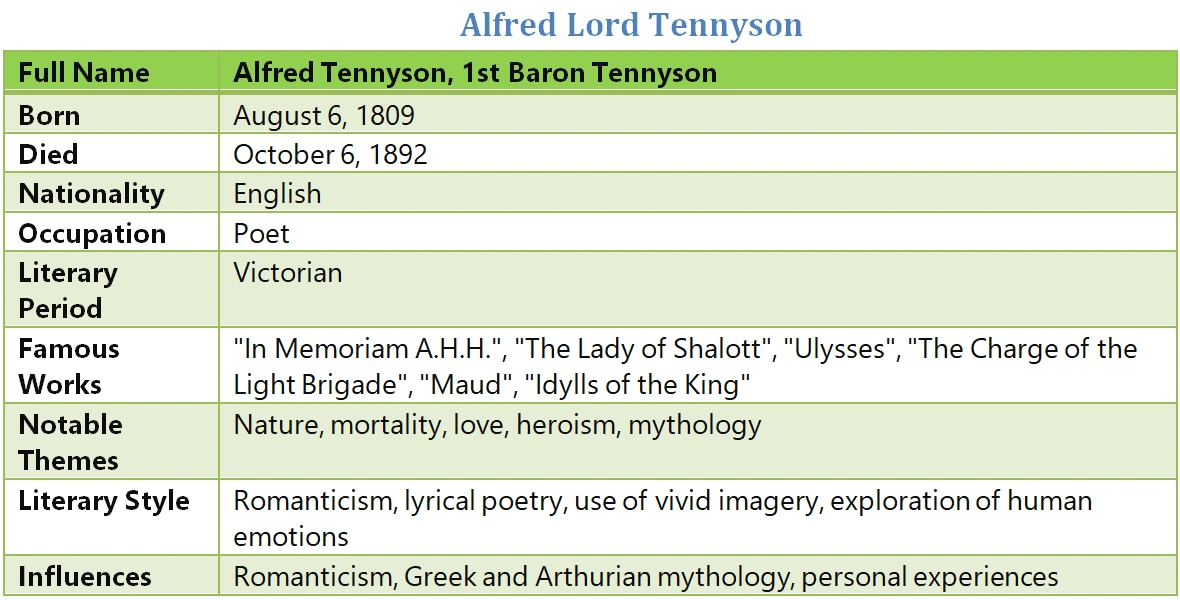29
Score: 0
Attempted: 0/29
Subscribe


Alfred Lord Tennyson Basic info
| Full Name | Alfred Tennyson, 1st Baron Tennyson |
| Born | August 6, 1809 |
| Died | October 6, 1892 |
| Nationality | English |
| Occupation | Poet |
| Literary Period | Victorian |
| Famous Works | “In Memoriam A.H.H.”, “The Lady of Shalott”, “Ulysses”, “The Charge of the Light Brigade”, “Maud”, “Idylls of the King” |
| Notable Themes | Nature, mortality, love, heroism, mythology |
| Literary Style | Romanticism, lyrical poetry, use of vivid imagery, exploration of human emotions |
| Influences | Romanticism, Greek and Arthurian mythology, personal experiences |
Alfred Lord Tennyson Books names
| Poems, Chiefly Lyrical | 1830 |
| Poems | 1832 |
| The Princess | 1847 |
| In Memoriam A.H.H. | 1850 |
| Maud | 1855 |
| Idylls of the King | 1859 |
| Enoch Arden, &c. | 1864 |
| The Holy Grail | 1869 |
| Ballads and Other Poems | 1880 |
| Tiresias and Other Poems | 1885 |
| Demeter and Other Poems | 1889 |
| The Death of Oenone, Akbar’s Dream, and Other Poems | 1892 |
| The Foresters, Robin Hood and Maid Marian | 1892 |
| The Works of Alfred Lord Tennyson | 1907 (posthumous) |
MCQs & Summary of Some Famous Poems by Alfred Lord
- The Lady of Shalott MCQs & Summary
- Ulysses MCQs & Summary
- Tears, Idle Tears MCQs & Summary
- The Charge of the Light Brigade MCQs & Summary
- Break, Break, Break MCQs & Summary
- Crossing the Bar MCQs & Summary
- In Memoriam A.H.H. MCQs & Summary
- Locksley Hall MCQs & Summary
- Tithonus MCQs & Summary
- The Lotos-Eaters MCQs & Summary
Famous English Authors MCQs
- William Wordsworth MCQs
- William Shakespeare MCQs
- Robert Browning MCQs
- W B Yeats MCQs
- Edmund Spenser MCQs
- Chaucer MCQs
- John Milton MCQs
- S T Coleridge MCQs
- Lord Byron MCQs
- PB Shelley MCQs
- John Dryden MCQs
- John Keats MCQs
- Charles Dicken MCQs
- Alfred Lord Tennyson MCQs
- Charles Lamb MCQs
- D.H Lawrence MCQs
- Thomas Hardy MCQs
- Matthew Arnold MCQs
- John Galsworthy MCQs
- George Bernard Shaw MCQs
- T.S Eliot MCQs
- Ben Jonson MCQs
- Francis Bacon MCQs
- Alexander Pope MCQs
- Oliver Goldsmith MCQs
- Joseph Addison MCQs
- Dr Samuel Johnson MCQs
- Henry Fielding MCQs
- Sir Walter Scott MCQs
- Jane Austen MCQs
- Dr. Samuel Johnson MCQs
- English Comedy MCQs (Oliver Goldsmith)
- Alexander Pope MCQs (Neo-Classical Age of English Poetry)
- Daniel Defoe MCQs
- Dr. Jonathan Swift MCQs
- Richard Steele MCQs
- English Drama MCQs
- Elizabethan Drama MCQs [14th to 17th century]
- Elizabethan Prose MCQs
More English Literature MCQs
- English Poetry MCQs
- History of English Literature MCQs
- Sentimental Novels MCQs
- Sentimental Poetry MCQs
- Legends Of English Literature MCQs
- English Literature Quiz
- English Literature Important Multiple Choice Questions Answers
- Sons And Lovers by D H Lawrence MCQs
- The Waste Land, A Poem by T. S. Eliot MCQs
- Drama Origin MCQs
- History of the Renaissance Period MCQs
- English Pros MCQs
- Non-Dramtic Poets Of The Elizabethan Age MCQs
- The Cavalier Poets of 17th-century MCQs
- Metaphysical Poets of 17th century MCQs
- Renaissance Period of 14th, 15th, and 16th centuries MCQs
- Puritan Poet MCQs
- Restoration Comedy by William Congreve & Wycherley MCQs
- Satire MCQs – Renaissance Period by John Dryden
- English Essayists MCQs
- Romantic Period of Romantic Poets MCQs
- English language MCQs
- English Humour MCQs [American Literature]
- Early Writers of American Literature MCQs
- History of American Literature MCQs
- American Prose MCQs [English Realism ]
- American English Critics
- New Englanders Authors MCQs
- MCQs on American Literature After Independence
- American Playwrights MCQs
- New American Poetry MCQs
- British English Critics MCQs
- Ancient English literature MCQs
- Important English Literature MCQs for Public Service Commission
- English Literature Repeated Important MCQs
- CSS English Literature MCQs
- History of Early Period MCQs
- The Anglo-Saxon period MCQs
- The Age of Chaucer in the Early Period MCQs
- The Anglo-Norman Period of French Writers MCQs
- Metrical Romances MCQ (Anglo-Saxon Period)
- Revival of Learning MCQs (1400-1550)
- Applied Linguistics MCQs
- Language Change MCQs